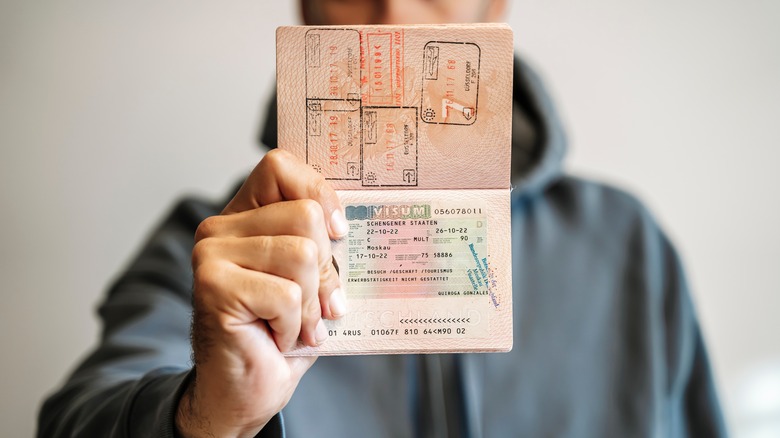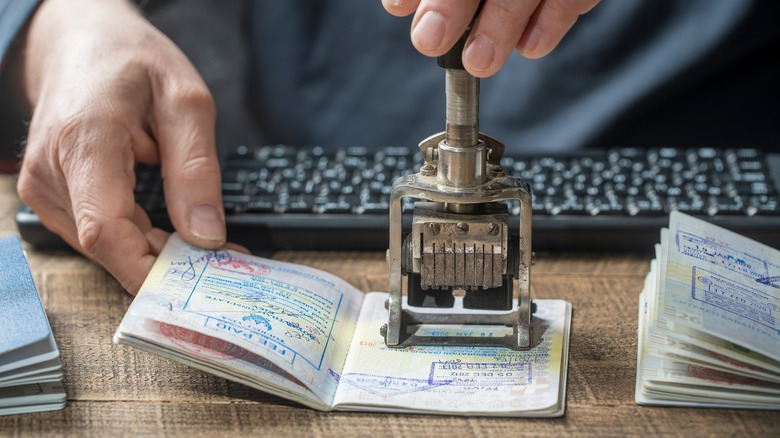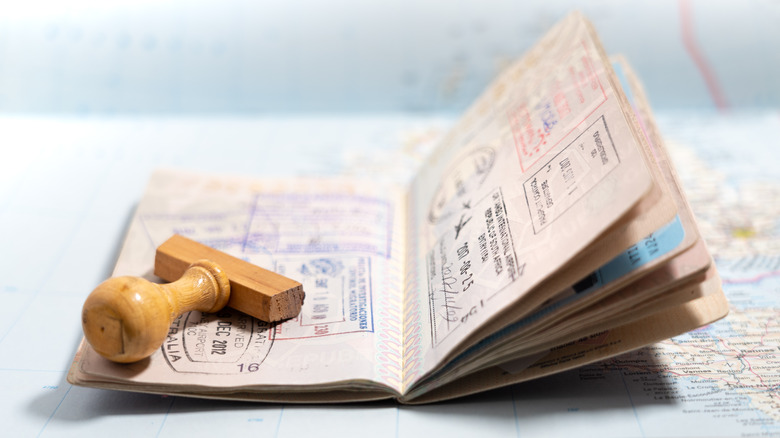Here's Why You Didn't Get A Stamp On Your Passport At The Airport
Many of us treat our passports as one of our most cherished possessions, and honestly, why not? Regardless of how powerful your passport is, it serves as our literal pass to enter other countries, including back to our own. Some folks even slap on fancy passport covers they spent money on for extra protection, while others fuss over looking nice in their passport photos since they usually last a decade and function as a valid form of identification, too. But let's be real, the best part of a passport is the stamps. Part of the fun of visiting other countries is collecting those little inked mementos. Unfortunately, the days of collecting them are dwindling as more countries go digital.
It wasn't too long ago when avid travelers would flip through their passports, proudly showing off the stamps accumulated from years of adventures. Some stamps are straightforward: Just the country, date, and length of stay. Others, though, sport intricate designs with illustrations unique to that nation. For instance, the Seychelles passport stamp features the coco de mer nut, a seed that comes from the coco de mer tree, which you can only find in the country. Whatever the case, stamps also double as a souvenir to remind you of your many travels. But these days, as you jet from one country to another, you might notice immigration officers doing less stamping and more ... well, nothing.
Many countries are going digital, foregoing the need for stamps
Don't be surprised if your passport stays stamp-free on your next international adventure — or even when you return to the U.S. More countries are ditching inked stamps in favor of digital passes. Leading the charge is Australia, which introduced the SmartGate system in 2007, relying on biometrics like facial recognition and built-in passport chips. Singapore, Hong Kong, and Argentina, among others, have also mostly phased out physical stamps. The European Union is jumping on the bandwagon too, launching its Entry/Exit System (EES), which features automated checks, in late 2024.
In 2022, U.S. Customs and Border Protection completed the rolling out of digital entry stamps, letting eligible travelers breeze through e-gates for a quicker immigration process. If your passport has a tiny camera symbol on it, you're likely eligible because that means your passport is an e-passport. And instead of facing an immigration officer and getting your passport stamped, you just have to scan it. Soon enough, passports might even become obsolete. "E-gates are a great thing, but we'd like to see this go a lot further and get into contactless travel," Perry Flint, a spokesman for the International Air Transport Association, told The Washington Post.
Apparently, ditching physical passports is better for security since they can be damaged or tampered with. "[We are] saying goodbye to manual passport controls and welcoming electronic checks [to] speed up queues and improve security," EU spokesperson Anitta Hipper said (via ABC News Australia).
There are still places where you can ask for stamps
But just because there is an increasing number of countries doing away with stamps doesn't mean you can no longer get them. If you want a physical memento of your entry to a certain country, all you have to do is ask. The Canada Border Services Agency website explicitly states that you simply have to ask a border services officer to stamp your passport should you need one for any reason. The same goes for the Australian Border Force, which grants stamps to travelers who ask for them. The United Arab Emirates also grants stamps to tourists who make a request, with a Reddit user noting, "In Dubai i asked to get a stamp instead to go to e-gates and they accepted (in that moment the airport was very crowded). In Abu Dhabi the same, when i asked they accepted every time i asked for a stamp."
What you must avoid at all costs, however, is getting a souvenir stamp from tourist places in lieu of a legitimate entry or exit stamp from a country's immigration officer. Doing so may end up damaging or invalidating your passport altogether. "The Department could potentially consider novelty stamps as 'damage' to the U.S. passport," a U.S. State Department official told Travel + Leisure. "We cannot comment on what passport damage or alteration might cause the Department of Homeland Security or the government of a foreign country to prevent entry at the border."


